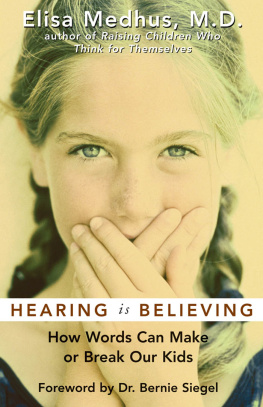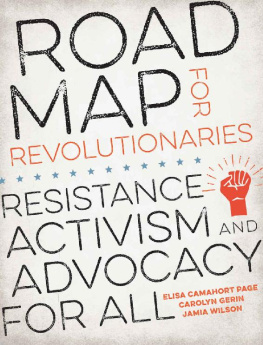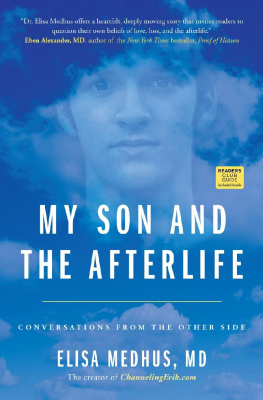After the death of his mother, he had spent five years in the house of his brother. It was not from what he said but from the way he said it that his enormous animosity toward the domineering, cold, and unfriendly nature of his brother became evident.
Then, in short, not very pregnant sentences, he related that he had a friend now who very much loved and admired him. Following this communication, there was a prolonged silence. A few days later he reported a dream: he saw himself in a strange city with his friend, except that the face of his friend was different.
Wilhelm Reich, Character Analysis
Shes driving. A Monday morning in July, hot outside, the windows of her Honda are down and the highway air is rushing in. Its the sixth hour of a daylong trip from the town where her dead son is buried to the town where she lives now with her husband and living son.
Her name is Elisa Macalaster Brown. She makes this trip once a year: drives to Wisconsin, stays in a motel, drinks coffee and reads magazines in the places she used to go, when both boys were alive and they all lived there together. She visits the grave, never for long. She watches television in her room. She remembers people from when she lived there, and if she sees them she says hello, but she never seeks them out. They know why shes there and they dont want to talk about it. When shes finished she gets back into her car and goes home, and thats what shes doing now.
Interstate 90 is a dull gray strap laid over brown land. Theres a drought here and everything is dead. Somewhere in Ohio. Other cars can be seen far ahead and far behind, but nobody passes anybody else. Soon shell have to stop for lunch, but for now she is content being hungry.
She likes to drive this car shes had it for a dozen years. Silas and Sam used to ride in back, on the way to soccer practice or music lessons, in the days when they could be persuaded to care about such things. There was a dog for a while, Dereks dog from before they married, but it died. The car still smells a little like dog, but all traces of Silas are gone. Sam borrows the car sometimes, filling the ashtray with his cigarette butts and leaving them there for Elisa to clean up. No, thats not fair it has nothing to do with her. He just forgets. Hes twenty-five, a year older than his brother would be.
But for now Elisa is alone. Solitude is something she learned how to love, and now she loves it better than almost anything. She loves it at home, in her filthy little studio at the back of the house, with her radio and paints, where she goes on her day off when Derek is at work. But she is most alone in a car, on a trip, this trip, with the windows down and the wind and highway in her ears. Or in a storm, windows shut, defogger roaring, the rain thudding against the metal and glass. She doesnt listen to the radio. Its too easy to get invested in something, only to hear it fade away. Not that theres much on the radio to capture her interest. She doesnt like the news. Politics are meaningless to her. She didnt care who won the 2008 election this disgusted people she knew. But they forgave her because her son was dead and they figured that had something to do with it.
She believes that Silass death makes people feel superior to her. They decided at some point that it was probably her fault. In any event, her days of worrying about other peoples opinions of her are long over.
Everythings going to change in a couple of minutes.
The Honda has a crack in the windshield that runs from the lower left-hand corner to a spot at eye level on the passenger side. She is looking at the crack, or rather through the crack, to the white line on the roadside that it parallels. This is a habit of hers that she is now indulging, keeping the crack aligned with the line.
When she was a teenager and her father took her out to the suburbs to teach her to drive, he recommended that, in order to stay on the road, she should keep the hood ornament aligned in her vision with the white line. It was one of four stations, as he put it, for the eye to visit: side mirror, rearview mirror, speedometer, hood ornament. Even the shortest journey should consist of a constant cycling among the four. He was methodical that way. When her mother drank or grew depressed, and Elisa ended up in tears in her bedroom with the radio turned up, her fathers knock was never far behind; he would sit at the foot of her bed, ostentatiously not touching her, and offer tried and tested methods for dealing with her mother: never look directly into her eyes when she is in a state; never tell her that she reminds you of her mother; always offer audible feedback to indicate youre listening; frequently use the phrase of course youre right. As though the woman were a problem to be solved.
Which in some ways she was. Which in some ways Elisa is, as she is painfully aware. Derek, to his credit, doesnt try. He lets her wend her unthinking way through her life, making only the subtlest suggestions, usually coiled up inside the phrase Youre a scientist, you figure it out. A reminder of what she gave up. An unasked question of why.
The problem, of course, with her fathers driving method is that it leaves out actually looking where youre going. In truth it is not necessary to align anything with anything, in order to drive. You just focus on a point in the distance and move toward it. Here on the highway, Elisa feels proud to have overcome this limitation in her technique; gazing through the crack is just a tic. But outside the car, in her life, this has long been, and remains, a problem. There is only what lies directly in front of her, and she is afraid to look away from it. She is resourceful; tough, she hopes; able to cope with whatever she finds immediately before her. But she doesnt want to look up and see the future.
A shrink told her that once, about herself. Facile nonsense, she told Derek. Derek nodded in the way he nodded when he thought she was wrong.
She is feeling the feeling of being hungry and thinking about what food she will settle for, when she finally decides its time to eat. A spring inside the drivers seat is worrying at her back. One cloud is in the sky, its bottom edge just visible in the tinted area running along the top of the windshield. Sunlight has slashed the dashboard in two and she can see her fingerprints in the dust, from where she braced herself several days ago, at a rest stop on the outbound leg of the trip, while she was picking some money up off the passenger-side floor.
Everything is so clear and vivid, she is almost moved.
She married at twenty-one. Derek was in law school he was twenty-five, wore a tie; he took her out and drank one bottle of beer and they had sex in his room. He was consistent in everything, the things he said, the ways he touched her: it flattered her, that he should care enough to do the things he knew would please her. She took him home to Chicago, and her parents embarrassed her, with their sagging bookcases and thick eyeglasses and Oriental rugs worn through to the boards. Growing up, she had been smuggled into jazz clubs, she read fantasy novels in the back row of Marxist lectures, inhaled pot smoke on her way to bed. Blacks and gays came to the house and she sat on their knees. Cops broke up her parents parties. Karl Popper once took her to a Cubs game.
But Derek managed to impress them, laughing at their jokes, pretending to sympathize with their politics. When they told him he was welcome to sleep with Elisa in her room he said no thanks, the couch was fine. During the night she went to him.
Sorry, she whispered.










